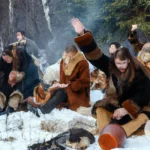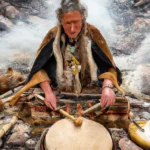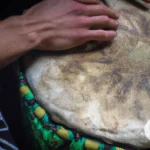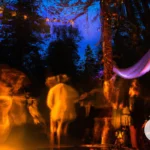Shamanism, a spiritual practice that dates back thousands of years, revolves around the belief that everything in the world has a spirit, and that these spirits can be communicated with. One important aspect of shamanism is the honoring of ancestors, who are considered to be the bridge between the physical world and the spirit world. But how exactly do different shamanic traditions approach the idea of honoring ancestors? In this article, we’ll explore the beliefs surrounding ancestors in shamanic practices, the different approaches to honoring them, and the various traditions found across the world.
Ancestors in Shamanism
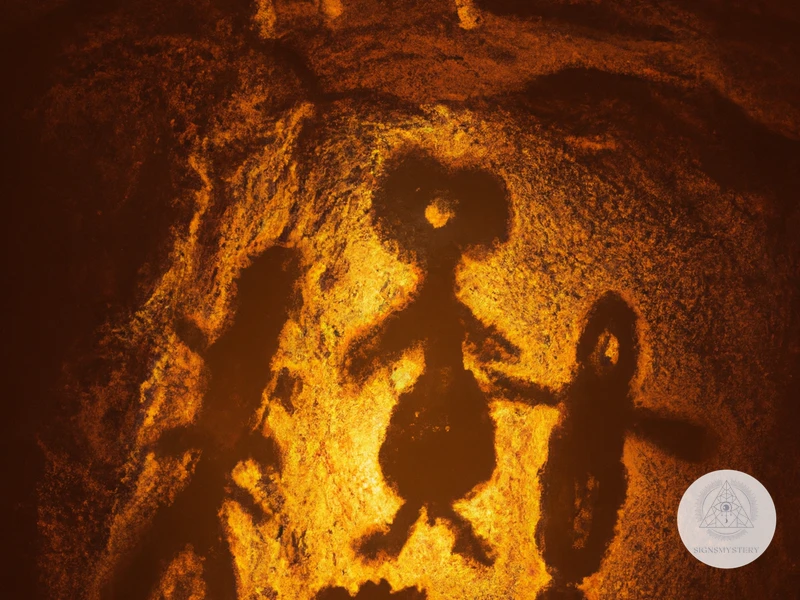
In Shamanism, ancestors play a critical role in the spiritual practice. Shamans believe that our ancestors’ spirits continue to exist and hold valuable knowledge that can help guide and aid us in our lives. There is a deep-rooted connection between past and present, and ancestral spirits can be called upon for assistance, protection, and healing. Different cultures and traditions have varying beliefs and approaches when it comes to honoring ancestors, but the overall concept remains consistent. Whether it’s through ancestral altars and offerings, ancestral healing and communication, or ancestral ceremonies and rituals, shamanic practitioners strive to connect with their ancestors to strengthen their spiritual ties and gain insight into their ancestral lineage. DbSet/shamanism-ancestral-connections/ is a great resource to learn about the importance of ancestral connections in Shamanism.
Beliefs About Ancestors in Shamanic Traditions
In shamanic traditions, it is believed that our ancestors continue to play an important role in our lives even after their passing. The belief is that they are still present and can influence our lives, and it is therefore important to honor them and maintain a strong connection with them. Here are some of the beliefs that are prevalent in shamanic traditions about ancestors:
| Ancestors are guides: | Shamanic traditions believe that the ancestors are not only present but also play a vital role as guides in our lives. They help us navigate through different challenges and difficulties by passing on their wisdom and experience. |
| Ancestors can influence our lives: | Another belief among shamanic traditions is that our ancestors can influence our lives in many ways, both positive and negative. For instance, if our ancestors were healers, we may have inherited their healing abilities. Alternatively, if they suffered from a certain trauma, we may also inherit that trauma, which can manifest as physical ailments or emotional blocks. |
| Ancestors are protectors: | Shamanic traditions also believe that our ancestors can act as protectors, shielding us from harm and negative energies. |
| Ancestors are part of a lineage: | Ancestors are part of a lineage that carries a unique shamanic heritage. That heritage is full of ancestral wisdom, shamanic knowledge, and healing traditions that have been passed down through generations. |
The belief in the role of ancestors in our lives is present in many cultures around the world and is an essential part of shamanic traditions. Maintaining a strong connection with our ancestors is therefore crucial, as it helps us tap into a lineage of ancestral wisdom and healing and navigate through life’s challenges with greater ease and clarity. For more information on ancestral communication in indigenous cultures, check out this article or read about shamanic heritage lineage.
The Role of Ancestors in Shamanic Practice
Shamanic practitioners believe that our ancestors occupy a special place in our lives and in the spirit world. They are regarded as powerful allies who can guide us in our journey and help us heal from physical, emotional, and spiritual illnesses. For many shamanic traditions, ancestors are seen as a source of ancestral trauma.
Shamans believe that our ancestors’ unresolved traumas, hurts, and pains can be passed down from generation to generation. These unresolved issues can manifest as spiritual blockages, emotional disorders, and physical diseases. It is essential to heal our ancestral lineage, healing ancestral wounds, to free ourselves from the negative karmic cycle.
Ancestors also play a pivotal role in shamanic divination. Shamans often call upon their ancestors to help them read signs and symbols in the natural world. They believe that their ancestors can speak to them through the wind, animals, and other elements of nature. The messages from the ancestors can be interpreted to gain insight into the past, present, and future events.
Ancestors are regarded as guardians and protectors of their lineage. Shamans believe that their ancestors’ spirits can intervene in their life to provide them with protection from harm and misfortune. Shamanic practitioners ask for their ancestor’s blessings and guidance in their daily life and spiritual practices.
The role of ancestors in shamanism is multifaceted. They offer guidance, healing, protection, and intervention in the spiritual realm. By connecting with our ancestors, we can strengthen our ancestral connection and tap into the ancestral wisdom to enrich our lives and heal ourselves.
Approaches to Honoring Ancestors in Shamanism
Honoring ancestors is a crucial aspect of shamanic practice, and there are several ways to approach it. One approach is to create ancestral altars, which are dedicated spaces for honoring and connecting with ancestors. These altars can be adorned with family photos, sacred objects, and offerings such as flowers, food, and incense. Another approach is ancestral healing and communication, which involves seeking guidance and healing from ancestors through shamanic journeying or other forms of meditation. Shamanic practitioners may also perform ancestral ceremonies and rituals, such as ancestor veneration practices or ancestral lineage healings. These practices can help people connect with their ancestral lineage and gain a deeper understanding of their past. If you are interested in strengthening your ancestral connection through shamanic practice, you may consider learning more about shamanic journeying techniques or seeking guidance from experienced shamanic practitioners.
Ancestral Altars and Offerings
Ancestral altars and offerings are a common practice in shamanism for honoring ancestors. These altars are typically set up in a sacred space, such as a home or a healing room, and serve as a physical representation of the connection between the living and the dead.
Altars can be simple or elaborate, depending on the practitioner’s preference and cultural tradition. However, the most important aspect of an ancestral altar is the intention behind it. It is a way of connecting with one’s ancestors and showing gratitude for their guidance and protection.
Offerings are an essential part of ancestral altars. They are a way of giving thanks to the ancestors and asking for their continued assistance. Offerings vary greatly from culture to culture, but some common examples include fruits, flowers, candles, incense, and water.
Here are some examples of ancestral altar offerings from different cultures:
| Culture | Offerings |
|---|---|
| African | Food, drink, tobacco, cowrie shells |
| Native American | Tobacco, cornmeal, sage, sweetgrass |
| Asian | Tea, rice, fruit, incense, candles |
| European | Bread, wine, flowers, candles |
It is important to note that offerings should be given with gratitude and respect. They should be placed on the altar with care and intention, not as an afterthought. It is also essential to dispose of offerings properly, following cultural or personal guidelines.
Ancestral altars and offerings are a meaningful way of connecting with one’s ancestors in shamanism. They provide a physical space for honoring and communicating with the deceased and are a reminder of the interconnection between the living and the dead. Through thoughtful intention and respect for cultural traditions, ancestral altars can be a powerful tool for personal and ancestral healing.
Ancestral Healing and Communication
Ancestral healing and communication is a vital aspect of honoring ancestors in shamanism. Shamanic practitioners believe that unresolved issues from past generations can affect current generations, including physical and mental health. Healing these issues can result in profound transformations for individuals, families, and even communities.
One approach to ancestral healing in shamanism is through ancestral lineage repair. This involves working with the spirits of ancestors to resolve past traumas, wounds, and injustices. By doing so, people can break free from negative patterns and gain access to new levels of healing and growth. The process often involves journeying, drumming, and other shamanic techniques to connect with ancestral spirits.
Another approach to ancestral healing is through ancestral ritual. This involves creating sacred spaces to honor and communicate with ancestors. Offerings such as flowers, food, and other items are placed on altars and can be used as a form of communication with ancestors. Shamanic practitioners may also use incense, candles, and other tools to create a meditative and sacred environment for ancestral communication.
Shamanic practitioners also use ancestral healing techniques to connect with their own ancestral heritage. This can involve learning about ancestral practices and traditions, connecting with relatives and ancestors, and engaging in rituals that align with their ancestral lineage. By doing so, people can gain a deeper understanding of their cultural heritage and connect with their ancestors in a meaningful way.
Ancestral healing and communication are powerful tools for shamanic practitioners to honor their ancestors. By connecting with the spirits of ancestors and resolving past traumas, individuals can gain access to higher levels of understanding, insight, and healing.
Ancestral Ceremonies and Rituals
Ancestral ceremonies and rituals are a vital part of shamanism when it comes to honoring ancestors. In many shamanic traditions, ceremonies and rituals are a way to pay homage and give thanks to the ancestors for their guidance and protection.
One common ancestral ceremony is the “Spirit Feast”. This is often practiced in Native American and African shamanic traditions. This ceremony involves preparing a meal and laying it out as an offering for the ancestors. The shaman then invites the ancestors to join in the feast and shares stories and songs with them. This ceremony is believed to strengthen the connection between the living and the dead, and also show gratitude for their guidance and protection.
Another ancestral ritual is called “Ancestral Journeying.” This practice is a way to establish a connection with ancestors who have passed on to the other side. The shaman will create a sacred space and perform a ritual to invite the ancestor’s spirit to come forth. The shaman may then journey to the spirit world to meet with the ancestor and seek guidance or advice.
In some shamanic traditions, drumming and dancing are used to honor the ancestors. This is especially prominent in African and Native American traditions. Drumming and dancing are believed to summon the spirits of the ancestors, and the shaman may even enter into a trance state to connect more deeply with the ancestors.
It should be noted that ancestral ceremonies and rituals are unique to each shamanic tradition and may vary depending on culture and belief systems. However, the common thread among these ceremonies and rituals is the intention to strengthen the connection between the living and the dead, and show gratitude and respect for their guidance and protection.
Ancestral ceremonies and rituals have a significant role in shamanic practice and are an essential part of honoring ancestors. These ceremonies and rituals allow for a deeper connection with the spirit world and can provide valuable guidance and wisdom from ancestors who have passed on.
Traditions of Honoring Ancestors in Shamanism
Throughout the world, different cultures have developed unique traditions for honoring their ancestors in shamanic practice. African ancestral traditions, for example, often involve the use of masks and other ritual objects in ceremonies that pay homage to ancestral spirits. Meanwhile, Native American shamanic traditions may involve the creation of sacred spaces or medicine wheels to connect with and honor ancestors. In Asian ancestral traditions, practices such as meditation and the use of incense may be employed to honor ancestors and seek their guidance. Finally, European ancestral traditions often focus on the veneration of ancient gods and goddesses who are seen as ancestral figures. Regardless of the specific tradition, the honoring of ancestors remains a cornerstone of shamanic practice in many parts of the world, offering a powerful way to connect with the past and seek guidance for the future.
African Ancestral Traditions
African ancestral traditions are rich and varied, reflecting the diversity of the continent’s many cultures. Despite these differences, certain common themes and practices can be found across many African shamanic traditions. Here are some of the most prominent examples:
- Connection to the Land: In many African cultures, a strong connection to the land and the natural environment is key to ancestral worship and shamanic practice. The ancestors are seen as having a presence in the natural world, and their spirits may be found in particular trees, hills, rocks, or other landmarks. This connection to the land is often reflected in the music, dance, and other rituals used to honor the ancestors.
- Ancestor Altars: African shamanic traditions may use altars or shrines to honor the ancestors. These altars may include offerings of food, drink, or other items that were special to the ancestors in life. The offerings are typically intended to feed and sustain the ancestors’ spirits, which are thought to be hungry and thirsty after their journey into the afterlife.
- Divination: Many African shamanic traditions use divination techniques to communicate with the ancestors and gain insights into future events. Divination may involve shells, bones, stones, or other objects that are thrown or cast in a specific pattern. The patterns and alignments of the objects are then interpreted to reveal messagesfrom the spirits of the ancestors.
Subscribe to Our Newsletter
Sign up to receive the latest news and updates.
- Drumming and Dance: African shamanic traditions often use drumming and dance as a way to honor the ancestors and communicate with their spirits. This approach is particularly prominent in West African traditions such as Yoruba, which use drumming and dance as a way to evoke the spirits of the ancestors and draw them into the physical world to commune with the living.
African ancestral traditions offer a unique and powerful approach to shamanic practice. By honoring the land, creating ancestor altars, using divination techniques, and incorporating drumming and dance, practitioners can draw on the wisdom and guidance of their ancestors to enrich their lives and deepen their connection to the natural world.
Native American Ancestral Traditions
Native American ancestral traditions vary greatly across tribes, each with its own unique practices and beliefs. However, a common thread among many Native American tribes is the strong connection to the natural world and the belief that all living things, including ancestors, continue to exist in spirit form.
One way Native American tribes honor their ancestors is through the creation of ancestral altars. These altars typically feature photographs or objects that belonged to the ancestor. Offerings such as tobacco, sweet grass, or cornmeal may also be made as a sign of respect.
Another common practice among Native American tribes is ancestral communication and healing. Many tribes believe that their ancestors continue to watch over and guide them. Shamanic practitioners may journey to the spirit world to communicate with ancestors and seek their guidance or healing.
Ceremonies and rituals are also a significant part of many Native American ancestral traditions. For example, the Lakota tribe has a ceremony known as the Sun Dance, which is a way to honor ancestors and connect with the spirit world. Other tribes may have variations of this ceremony or other rituals specific to their culture.
Finally, some Native American tribes believe that the spirits of past ancestors can be used for protection or guidance. For example, the Cherokee have a tradition of calling upon their ancestors for protection through the use of prayer or song.
Native American ancestral traditions are diverse and often deeply rooted in the natural world. Through practices such as ancestral altars, communication, ceremonies, and protection, tribes honor and connect with their ancestors, recognizing their important place in the spiritual realm.
Asian Ancestral Traditions
Asian ancestral traditions vary greatly depending on the region and cultural context. However, there are some common themes and practices that can be found in many Asian shamanic traditions.
1. Ancestor Veneration: In many Asian cultures, there is a deep respect and reverence for ancestors. Ancestral altars are commonly found in family homes and offerings are made to honor and show gratitude to ancestors.
2. Filial Piety: The concept of filial piety is deeply rooted in many Asian cultures. It is the idea that one should show respect, loyalty, and obedience to one’s parents and ancestors. This can be seen in many shamanic practices where ancestors are consulted for guidance and wisdom.
3. Taoist Shamanism: Taoist shamanism is a form of shamanism that is rooted in Chinese culture and philosophy. It involves the use of various practices, such as divination, to communicate with spirits and ancestors. In Taoist shamanism, there is a belief in the immortality of the soul and the importance of honoring ancestors and ancestral spirits.
4. Shintoism: Shintoism is a Japanese religion that involves the worship of various kami (spirits or deities). It is also closely tied to ancestor worship and reverence. Ancestor veneration is an important aspect of Shintoism, and many Shinto shrines and temples have ancestral altars where offerings can be made.
5. Tibetan Buddhism: Tibetan Buddhism is a form of Buddhism that is practiced in Tibet, as well as other parts of Asia. It involves various practices, such as meditation and chanting, to connect with the divine and achieve enlightenment. Ancestor worship is also a key aspect of Tibetan Buddhism, and there are specific practices and rituals that are performed to honor ancestors and ancestral spirits.
Asian ancestral traditions place a great emphasis on ancestor veneration, filial piety, and the importance of connecting with ancestral spirits and wisdom. There are many different practices and rituals that are associated with Asian shamanism, and these practices continue to be an important part of many Asian cultures.
European Ancestral Traditions
Each culture in Europe has its unique way of honoring ancestors. However, all of them share the belief that ancestors play an essential role in the lives of their living relatives. Below are some of the European ancestral traditions:
| Greece | Celtic Europe | Germanic Europe |
|---|---|---|
| In Greece, ancestors were worshiped as heroes and demigods. They were believed to be able to help their living descendants achieve their goals and protect them from harm. | The Celts believed in the existence of the Otherworld, a place where their ancestors lived. They thought that their ancestors had the power to influence their lives and guide them through challenges. | The Germanic tribes believed that their ancestors lived in an afterlife called Valhalla. They would honor their ancestors during feasts and believed that they had the power to bring good luck and fortune. |
| Slavic Europe | Romania | Baltic Europe |
| The Slavic people believed that their ancestors were still present in the physical world, and they would invite them to the family’s celebrations. They would also light candles and leave food offerings on their graves to show respect. | In Romania, there is a tradition called “Clean Monday,” where families clean the graves of their ancestors and offer them food, drinks, and flowers. They believe that this helps them maintain a strong connection with their ancestors. | In the Baltic region, ancestors were regarded as a source of wisdom and guidance. People believed that their ancestors could share their knowledge and experiences with them, and they would often consult them before making important decisions. |
In all of these European ancestral traditions, the practices involved paying respect to ancestors, acknowledging their influence, and seeking their guidance. These practices were also helpful in acknowledging the importance of intergenerational bonds and the idea that the living and dead are connected.
Conclusion
Honoring ancestors in shamanism is a sacred practice that involves connecting with the ancestral spirits and seeking their guidance and wisdom. There are various approaches and traditions in shamanism that facilitate this connection, including ancestral altars and offerings, ancestral healing and communication, and ancestral ceremonies and rituals.
It is important for individuals to find which approach best resonates with them and to practice it with sincerity and respect. By honoring our ancestors, we not only honor their legacy but also tap into a source of power and support that can help us navigate the challenges of life.
Regardless of cultural background, people around the world have a deep reverence for their ancestors, recognizing the valuable contributions they made to society and the enduring impact they have on their descendants. Through the traditions of African, Native American, Asian, and European peoples, we see the universality of the human impulse to honor those who came before us.
As we continue to explore our own ancestral traditions and adopt new approaches to the practice of shamanism, we deepen our connection to our spiritual lineage and gain a greater appreciation for the interconnectedness of all things. By living in harmony with our ancestors and the natural world, we contribute to a more compassionate and sustainable way of life for ourselves and future generations.
To conclude, let us always remember to give thanks to our ancestors and to honor them in our daily lives, even as we forge ahead on our own unique path of spiritual growth and evolution.
Frequently Asked Questions
What is the importance of honoring ancestors in shamanism?
Honoring ancestors is an essential part of shamanism as it helps to connect with the ancestral spirits and gain their wisdom and guidance. It also strengthens the individual’s connection to their lineage and community.
What do shamanic traditions believe about ancestors?
Shamanic traditions believe that ancestors are important spiritual beings who possess valuable wisdom and guidance. They are believed to protect and guide their descendants and can also provide healing and spiritual growth.
What are some common approaches to honoring ancestors in shamanism?
Common approaches to honoring ancestors in shamanism include creating ancestral altars, offering gifts to ancestors, communicating with ancestors through meditation and divination, and performing ancestral ceremonies and rituals.
What is an ancestral altar?
An ancestral altar is a sacred space created to honor and communicate with ancestral spirits. It typically includes candles, incense, photographs of ancestors, and offerings such as food, drink, and flowers.
What is ancestral healing?
Ancestral healing is the process of working with ancestral spirits to heal unresolved issues or traumas that have been passed down through generations. It involves acknowledging and addressing the pain and trauma of ancestors in order to create healing for future generations.
What are some common offerings made to ancestral spirits?
Common offerings made to ancestral spirits include food, drink, flowers, incense, and prayer or meditation.
What is the purpose of ancestral ceremonies and rituals?
The purpose of ancestral ceremonies and rituals is to honor and communicate directly with ancestral spirits. They may also be performed to seek guidance, evoke healing, or to celebrate ancestral connections and lineage.
What are some African ancestral traditions?
Some African ancestral traditions in shamanism include creating ancestral altars, performing ancestor ceremonies and rituals, and using divination tools such as cowrie shells or bones to communicate with ancestral spirits.
What are some Native American ancestral traditions?
Some Native American ancestral traditions in shamanism include creating sacred pipe ceremonies, offering prayers and songs to ancestral spirits, and using sweat lodges or vision quests to seek ancestral guidance and healing.
What are some European ancestral traditions?
Some European ancestral traditions in shamanism include creating ancestor altars or shrines, celebrating ancestral festivals such as Samhain or Yule, and performing divination with Tarot cards or runes.





